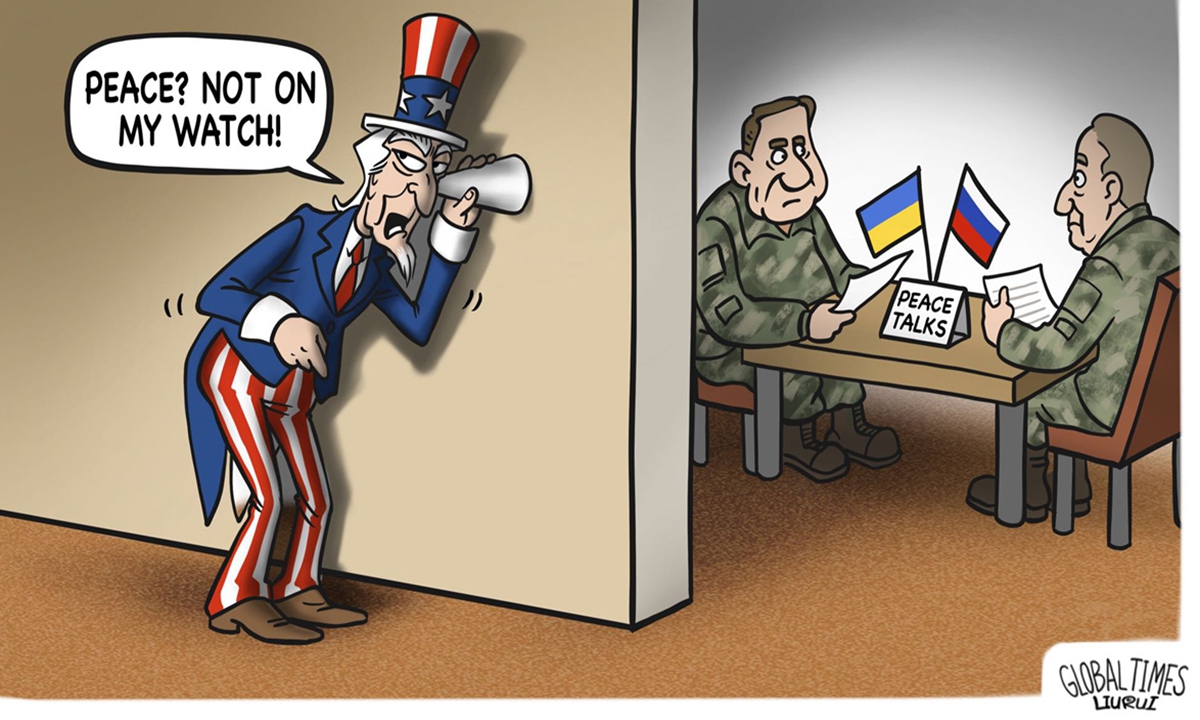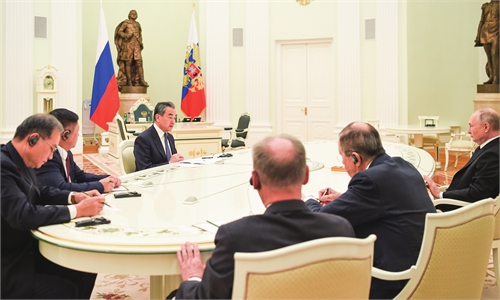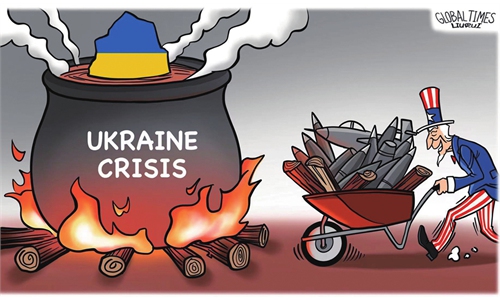
Illustration: Liu Rui/GT
One year on from the breakout of Ukraine crisis, most Western politicians seem as eager as ever to continue waging their proxy war against Russia, continuing the bloodshed in Europe's backyard. This is not to say they thirst for war - but if there's a war, and it's against Russia, they'll be damned if they're going to lose it.This type of leader sees conflict, especially the one between Kiev and Moscow, as a zero-sum game. For armchair generals like this, tragedy can be reconciled with the knowledge that it's not their troops who are dying, their cities being bombed or their civilians being displaced. It probably also explains why they have blithely rejected the best chance of peace since the fighting began.
Britain's Prime Minister Rishi Sunak talks of stepping up military aid for a "decisive victory" over Russia. The head of the UK's defense select committee Tobias Ellwood speaks of being "at war." US President Joe Biden frames it in the false narrative of "democracy versus autocracy" - a misleading, willful failure to acknowledge the complex historical, geopolitical and cultural background.
Only French President Emmanuel Macron seems to have anything like a nuanced view, urging that Russia should not be left "crushed" by the outcome of war. It is also only Macron who appears to be contemplating China's 12-point Ukraine peace plan with an open mind.
The 12-point position paper identifies key areas around which agreement should be sought. Most critical of these are de-escalating to ceasefire, cautioning against the threat of nuclear weapons, peace talks, humanitarian relief and respect for national sovereignty. These goals were welcomed almost immediately by Russia, which declared itself open to pursuing diplomatic and political routes to peace. In Kiev, Ukraine sees some merit in the proposals, and President Volodymyr Zelensky told a press conference that he is somewhat open to work with China.
There is also evidence that the capacity for common ground between Moscow and Kiev already exists. Agreements to permit grain shipments from Ukraine to the world and both Russia and Ukraine are involved in efforts to implement a nuclear safety and security zone around the Zaporizhzhya nuclear power plant. If agreed, it will be overseen by teams from the International Atomic Energy Authority. In April last year, both sides were reportedly close to reaching a settlement but the talks, in Turkey, were scuppered by an "almost without warning" visit to Ukraine by the UK's then prime minister Boris Johnson who pressured Zelensky to abandon the initiative. Johnson later admitted opposing the peace plan, even though it reportedly included a pledge by Russia to move troops back and one from Ukraine not to seek NATO membership.
Contrast these positive responses from the two national combatants in the conflict, with the negative - positively hostile - reaction from those committed to prolonging it by pouring billions of dollars' worth of weapons, ordnance and increasingly sophisticated equipment into the warzone.
NATO Secretary-General Jens Stoltenberg accused China of having "no credibility" as a peacemaker because of its strong ties with Russia and its refusal to condemn its military advance into Ukraine. Ursula von der Leyen, president of the European Commission, accused Beijing of having "taken sides" by making an unlimited friendship joint statement with Moscow. Antony Blinken, secretary of state for the United States - the largest supplier of weapons to Ukraine - expressed skepticism about China's professed neutrality.
Yet their opposition is flawed. It is those who are shouting for more war who are not to be trusted. It is precisely because China has remained above the political wrangling and not apportioned blame that it has been able to appeal to both sides as an honest broker. The declaration that there is no limit to bilateral strategic cooperation between China and Russia was made before the fighting even began.
What is being proposed is not a solution, but a pathway towards finding a solution. There will be no final outcome unless first steps are taken. Those opposing the plan must know that, yet they still oppose it. Do they want to weaken Russia with a prolonged conflict? Do they refuse to even try to seek peace, simply because the path is being shown by China, now so routinely demonised as the bogeyman of Western media that even the most outlandish criticism of it (such as preparing to supply weapons to Russia) is not challenged.
The purpose of the 12-point plan is to stop the fighting and start the talking. The main obstacle to that seems to be those opposing China's plan. What is the better choice? More war, or a pragmatic peace in which neither side may get everything it wants, but the killing stops? They cannot see beyond their own narrow interests. They cannot contextualize it other than in the limited perspective of their own world view. The biggest obstacles to peace in Ukraine are the blinkers currently being worn by Western leaders. They need to have their eyes opened.
The author is a journalist and lecturer living in Britain. opinion@globaltimes.com.cn


